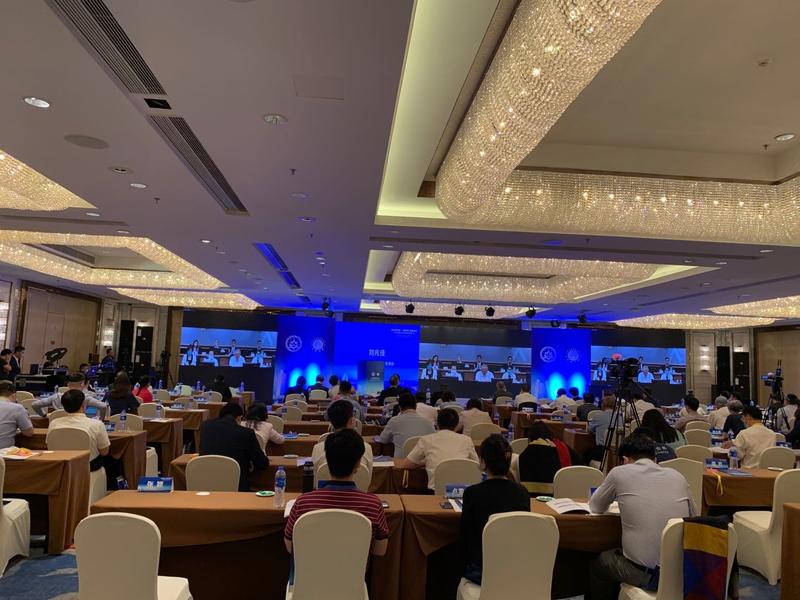 At an international conference on the Basic Law of Hong Kong Special Administrative Region held in Shenzhen on June 15, 2020, to mark the 30th anniversary of its promulgation. (PHOTO / CHINA DAILY)
At an international conference on the Basic Law of Hong Kong Special Administrative Region held in Shenzhen on June 15, 2020, to mark the 30th anniversary of its promulgation. (PHOTO / CHINA DAILY)
Hong Kong faces the same responsibility as the rest of the nation in safeguarding national security despite having a separate legal system, Deng Zhonghua, a deputy director of the Hong Kong and Macao Affairs Office of the State Council, said on Monday.
Recognized principles adopted by criminal law systems on the mainland are no different from those in HK, such as presumption of innocence and the right of the accused to defend themselves, and should be incorporated into the tailor-made law for Hong Kong, said Deng Zhonghua, a deputy director of the Hong Kong and Macao Affairs Office of the State Council
The proposed national security legislation will become an amulet for the special administrative region to guarantee its long-term prosperity and stability, he said at a seminar on Basic Law in Shenzhen.
The national security law, once enacted, will be an organic part of the local legal system, which no local legislation should contravene, he added.
ALSO READ: Security law for HK to 'boost Article 23 legislation'
The proposed law aims at closing a legal loophole in national security in the SAR. It is currently being drafted by the Standing Committee of the nation’s top legislature – the National People’s Congress (NPC). It aims to outlaw four types of acts – secession, subversion, terrorism and conspiracy with external forces.
While drafting the law, the NPC should make clear in the legislation the central government’s power to enforce the law in Hong Kong, said Deng.
Though the major responsibility of enforcing the national security law and the prosecution process will be bestowed upon the SAR following promulgation of the law, the central government should retain its jurisdictions over some special situations where national security is grossly compromised, he said.
Such special situations however will be few, Deng added.
The central government will establish national security agencies to oversee national security-related issues and build a coordination mechanism with local national security bodies, he said.
READ MORE: Luo: Central govt firm to enact security legislation in HK
Despite differences between legal and judicial systems of the Chinese mainland and Hong Kong, the established and recognized principles adopted by the criminal law systems on the mainland, which are no different from those in Hong Kong, should be incorporated into the tailor-made law for Hong Kong, said Deng.
These principles include the presumption of innocence and the right of the accused to defend themselves, he added.
Addressing the seminar, Chen Dong, deputy director of the Liaison Office of the Central People's Government in the HKSAR, said he believes the enactment of the national security law would earn the city stronger support from the central government, which will create broader development prospects for Hong Kong under the “one country, two systems” framework.
READ MORE: Tailoring law for HK in line with 'one country, two systems'
Wang Zhenmin, director of Center for Hong Kong and Macao Research and head of National Governance Institute, Tsinghua University, said on the issues relating to national security, the nation should adopt a one-for-all principle or system, just like the situations in the US and the UK.
“Though we are entitled to apply that principle in the case of Hong Kong by simply applying the national security law adopted on the mainland, we chose not to. Tailoring a national security law for Hong Kong is the most moderate and fundamental way to protect national security in Hong Kong,” the law professor said.
The proposed national security law is not to revise the Basic Law, but to address the issues the latter has yet to solve or provide an explicit provision about. The Basic Law will remain unchanged, Wang said.
Over the last two decades, tons of lies were spread about the "one country, two systems" policy, but Hong Kong still remains one of the cities with highest level of autonomy and freedom, putting to rest the rumors and lies. However, the detrimental impact falls on the youth, who have suffered and lost a lot, he added, referring to the fact that students made up about 40 percent of the 9,000 arrested during the prolonged street violence started since June 2019.
About one hundred people attended the one-day seminar, marking the 30th anniversary of the promulgation of the Basic Law.
READ MORE: HKEX chairman supportive of proposed security law


